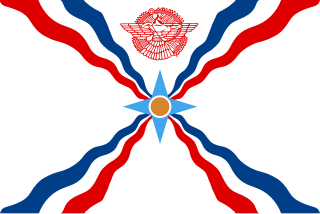
Assyria, also called the Assyrian Empire, was a Mesopotamian kingdom and empire of the ancient Near East and the Levant. It existed as a state from perhaps as early as the 25th century BC until its collapse between 612 BC and 609 BC - spanning the periods of the Early to Middle Bronze Age through to the late Iron Age. From the end of the seventh century BC to the mid-seventh century AD, it survived as a geopolitical entity, for the most part ruled by foreign powers such as the Parthian and early Sasanian Empires between the mid-second century BC and late third century AD, the final part of which period saw Mesopotamia become a major centre of Syriac Christianity and the birthplace of the Church of the East.

Kirkuk is a city in Iraq, serving as the capital of the Kirkuk Governorate, located 238 kilometres north of Baghdad. Kirkuk lies in a wide zone with an enormously diverse population and has been multilingual for centuries. There were dramatic demographic changes during Kirkuk's urbanization in the twentieth century, which saw the development of distinct ethnic groups. Kurds, Iraqi Turkmen, Arabs, and Assyrians lay conflicting claims to this zone, and all have their historical accounts and memories to buttress their claims.

Assyrian people, or Syriacs, are an ethnic group indigenous to Western Asia. Some of them self-identify as Arameans, or as Chaldeans. Speakers of modern Aramaic and as well as the primary languages in their countries of residence, the Assyrian people are Syriac Christians who claim descent from Assyria, one of the oldest civilizations in the world, dating back to 2500 BC in ancient Mesopotamia.

The Arameans were an ancient Northwest Semitic Aramaic-speaking tribal confederation who emerged from the region known as Aram in the Late Bronze Age. They established a patchwork of independent Aramaic kingdoms in the Levant and seized tracts of Anatolia as well as briefly conquering Babylonia.

Aram is a region mentioned in the Bible located in present-day Syria, including where the city of Aleppo now stands. At its height, Aram stretched from the Lebanon mountains eastward across the Euphrates, including parts of the Khabur River valley in northwestern Mesopotamia on the border of Iraq. The region was known as The Land of the Amurru during the Akkadian Empire, Neo-Sumerian Empire and Old Assyrian Empire in reference to its largely Amorite inhabitants. During the Neo-Assyrian Empire, Neo-Babylonian Empire and Achaemenid Empire Aram was known as Eber-Nari.
The Assyria Liberation Party or Gabo D'Furqono D'Othur was founded in 1995, and since 1997 the party has published the magazine Furqono (Liberation). The party is founded on the principles of Assyrian nationalism and the creation of an independent, sovereign state for Assyrians incorporating parts of southeastern Turkey, northeastern Syria and northern Iraq. The party's main support comes from Assyrian emigrants in Europe, Australia and United States.

Sarkis Aghajan Mamendo, is an Iraqi Assyrian politician who was appointed Minister for Finance and Economy in the cabinet of Iraqi Kurdistan on 7 May 2006.
Assyrians in Syria are people of Assyrian descent living in Syria. They constituted 2.0% of the pre-Civil War population of Syria of 23 million and 15-20% of the total number of Christians. Assyrian Christians are either Catholic, Church of the East or Syriac Orthodox. Pre-war scholarly estimates placed the total number of Assyrians belonging to the Assyrian Church of the East living in Syria at around 30,000, with between 15,000 and 20,000 of them living along the section of the Khabur river between Tal Tamer in the northwest portion of the river to the dam southeast of the city. They are distinct from the Syrian Christians of western, southern and central Syria, being Eastern Aramaic speakers rather than Arabic speakers, and being of Mesopotamian/Assyrian rather than Levantine/Aramean origin, and are an ancient pre-Arab indigenous people.

The Assyrian homeland or Assyria refers to a geographic and cultural region situated in Northern Mesopotamia that has been traditionally inhabited by Assyrian people. The areas that form the Assyrian homeland are parts of present-day northern Iraq, southeastern Turkey, northwestern Iran and, more recently, northeastern Syria. Moreover, the area that had the greatest concentration of Assyrians in the world until recently is located in the Assyrian Triangle, a region which comprises the Nineveh plains, southern Hakkari and the Barwari regions. This is where some Assyrian groups seek to create an independent nation state.
The Assyrian calendar is a solar calendar which begins in the year 4750 BC, begun by the internal date of the foundation of Assur. The year begins with the first sight of Spring. The Assyrian new year is still celebrated every year with festivals and gatherings. As of April 2019 AD, it is the 6769th year of the Assyrian calendar, and this calendar is used among many Assyrian communities.
Armenian–Assyrian relations covers the historical relations between the Armenians and the Assyrians, dating back to the mid 1st millennium BC.

The history of the Assyrian people begins with the appearance of Akkadian speaking peoples in Mesopotamia at some point between 3500 and 3000 BC, followed by the formation of Assyria in the 25th century BC. During the early bronze age period Sargon of Akkad united all the native Semitic-speakers and the Sumerians of Mesopotamia under the Akkadian Empire. Assyria essentially existed as part of a unified Akkadian nation for much of the period from the 24th century BC to the 22nd century BC, and a nation state from the mid 21st century BC until its destruction as an independent state between 615–599 BC.

Asōristān was the name of the Sasanian province of Babylonia from 226 to 637.
Syriac Christians are an ethnoreligious grouping of various ethnic communities of indigenous pre-Arab Semitic and often Neo-Aramaic-speaking Christian people of Iraq, Syria, Iran, Turkey, Lebanon, Jordan, Palestine, and Israel. Syriac Christians advocate different terms for ethnic self-designation. Syriac Christians from the Middle East are theologically and culturally closely related to, but should not be confused with the Saint Thomas Christians from India, whose ties to Syriac Christians were a result of trade links and migration by Assyrian Christians from Mesopotamia and the Middle East mostly around the 9th century.

Assyrian nationalism or Assyrianism increased in popularity in the late 19th century in a climate of increasing ethnic and religious persecution of the indigenous Assyrians of what is today northern Iraq, south-east Turkey and north-west Iran.

Al-Hamdaniya District is a district in the north-east of the Nineveh Governorate (Ninawa) of Iraq.

The Last Assyrians is a French documentary film by Robert Alaux.
Adasi was an Assyrian king, the last in a line of 7 kings designated by the Assyrian King List as usurpers of the Assyrian throne, who reigned from 1720 - 1701 BC after the ejection of the Amorite-ruled Babylonians from Assyria. He is credited in the Assyrian King List with stabilising Assyria and freeing it from civil war and Amorite influence. The Adaside dynasty of Assyria was named after him. He was succeeded by Bel-bani.

Throughout history there were few proposals for the establishment of an autonomy or an independent state for the Syriac-speaking Assyrians in northern Iraq.

Assyrian continuity is the claim by modern Assyrians and supporting academics that they are at root the direct descendants of the Semitic inhabitants who spoke originally Akkadian and later Imperial Aramaic of ancient Assyria, Babylonia and their immediate surrounds. Modern Assyrians are accepted to be an indigenous ethnic minority of modern Iraq, southeast Turkey, northeastern Syria and border areas of northwest Iran, a region that is roughly what was once ancient Assyria.













